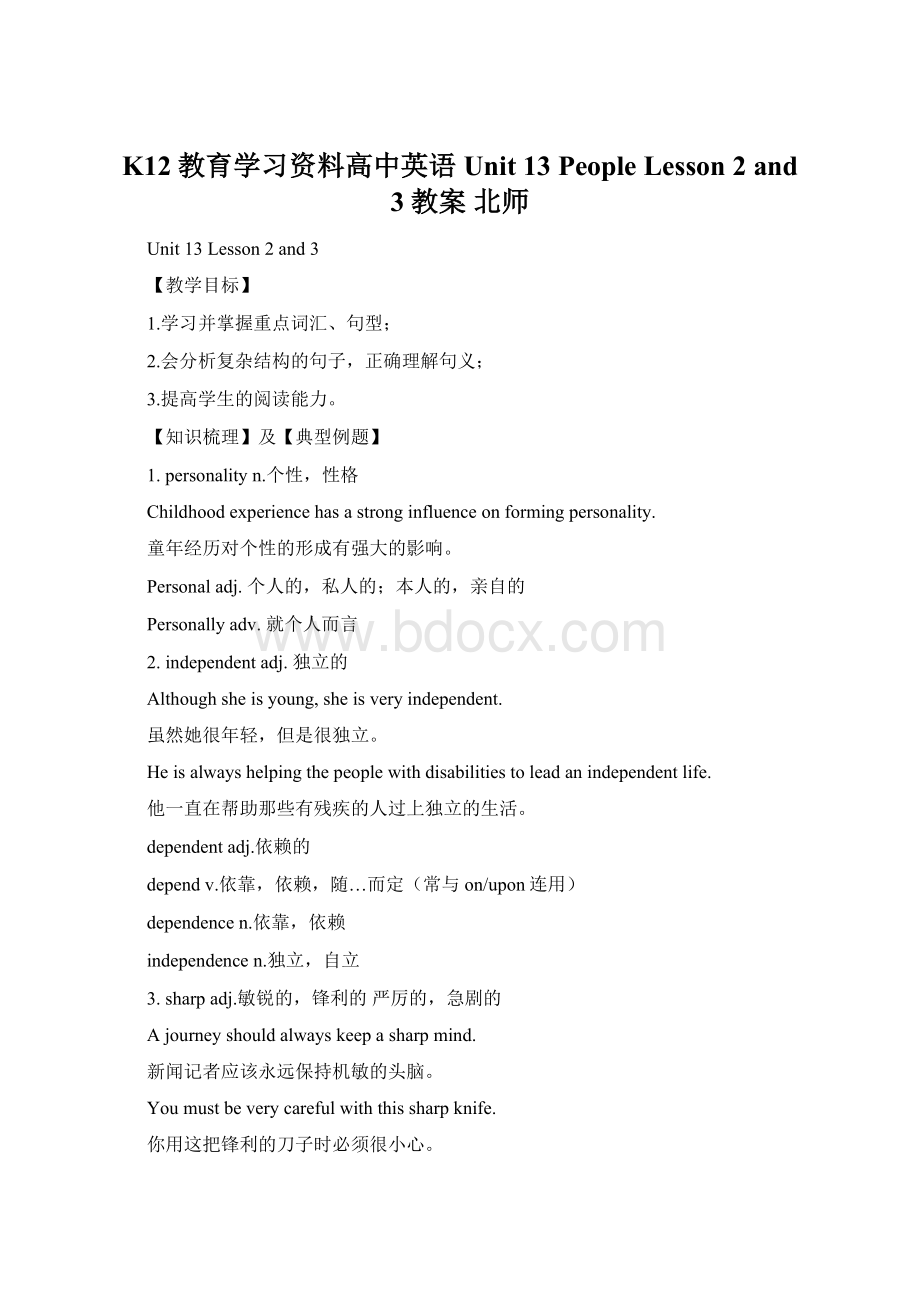K12教育学习资料高中英语 Unit 13 People Lesson 2 and 3教案 北师.docx
《K12教育学习资料高中英语 Unit 13 People Lesson 2 and 3教案 北师.docx》由会员分享,可在线阅读,更多相关《K12教育学习资料高中英语 Unit 13 People Lesson 2 and 3教案 北师.docx(14页珍藏版)》请在冰豆网上搜索。

K12教育学习资料高中英语Unit13PeopleLesson2and3教案北师
Unit13Lesson2and3
【教学目标】
1.学习并掌握重点词汇、句型;
2.会分析复杂结构的句子,正确理解句义;
3.提高学生的阅读能力。
【知识梳理】及【典型例题】
1.personalityn.个性,性格
Childhoodexperiencehasastronginfluenceonformingpersonality.
童年经历对个性的形成有强大的影响。
Personaladj.个人的,私人的;本人的,亲自的
Personallyadv.就个人而言
2.independentadj.独立的
Althoughsheisyoung,sheisveryindependent.
虽然她很年轻,但是很独立。
Heisalwayshelpingthepeoplewithdisabilitiestoleadanindependentlife.
他一直在帮助那些有残疾的人过上独立的生活。
dependentadj.依赖的
dependv.依靠,依赖,随…而定(常与on/upon连用)
dependencen.依靠,依赖
independencen.独立,自立
3.sharpadj.敏锐的,锋利的严厉的,急剧的
Ajourneyshouldalwayskeepasharpmind.
新闻记者应该永远保持机敏的头脑。
Youmustbeverycarefulwiththissharpknife.
你用这把锋利的刀子时必须很小心。
asharpriseinprices价格的急剧上涨。
搭配:
besharpwithsb.对某人刻薄/严厉
Keepasharpeyeonsb.密切关注某人
HewasverysharpwithmewhenIwaslate.
我迟到了,他狠狠地训了我一通。
Teachersalwayskeepasharpeyeonthosenaughtyboysinclass.
老师们在课上总是会密切关注那些淘气的男生。
HardlyhadSabrinafinishedherwordswhenAlbertsaid____,“Don’tbesomean,”pointingafingerofwarningather.
A.dreadfullyB.guiltily
C.indirectlyD.sharply
4.characteristicn.(一般用复数)特点,特性
Honestyremainsoneofhischaracteristics.
诚实依然是他的性格特点之一。
characteristic:
(1) adj. 特有的;典型的
Sympathy is the feeling characteristic of mankind.
同情心是人类特有的感情。
It is characteristic of him to talk nonsense.
胡说八道是他的特征。
(2) n. 特质;特出之处;特徵;特点
The characteristic I like best in him is his cheerfulness.
他的愉悦气质是我最喜欢的特点。
the body characteristics
身体特征
the chief characteristics 主要的特征
the distinctive characteristics 特征
the distinguishing characteristics of man 人类的特异性
one's facial characteristics 面部特征
the individual characteristics 个性
a marked characteristic 显著特征
character:
(1) n. 性格;品质
the qualities which make a person different from another;moral nature
Sports help to train a person's character.
运动有助于锻炼人们的性格。
He seems to be a man of good character.
看来他是一个品格优良的人。
(2) n. 人物;角色
a person in a book, play, etc.
Dr. Watson is a character in the Sherlock Holmes stories.
华生医生是福尔摩斯探案故事中的一个人物。
(3) n. 字体;记号
a letter, figure, or sign used in writing or printing
The bell bears an inscription in Chinese characters.
5.desiren.渴望,欲望v.渴望,想要
Theartistplayedapieceofmusicattheaudience’sdesire.
这位艺术家应听众的要求演奏了一曲。
Shedesiresforabreakthroughinherresearch.
她渴望自己的研究能够出现突破。
搭配:
Haveadesireforsth./todosth.渴望某物/做某事
atsb’sdesire=atthedesireofsb应某人的要求
desiresth/todosth.渴望某事/做某事
desirethat…(从句谓语动词用“should+动词原形”表示虚拟,should可省略)
4.satisfactionn.满意,满足
Thegoodnewswasasatisfactiontousall.
这则好消息令我们所有人都满意。
toone’ssatisfaction令人满意的是
withsatisfaction满意地
Tohersatisfaction,herdaughtermadegreatprogress.
令她满意的是,她的女儿取得了很大的进步。
Hesmiledwithsatisfactionwhenhewontherace.
他赢得赛跑后满意地笑了。
satisfyvt.使满足,使满意
satisfyingadj.令人满意的satisfiedadj.感到满足的
satisfysb.使某人满意
besatisfiedwith…对…感到满意
Iwasn’tsatisfiedwithourtreatmentatthathotel,soIshallcomplaintotheboss.
我不满意我们在那家旅馆受到的待遇,因此我要向旅馆老板投诉。
6.requirevt.需要;要求;命令
Thesepetsrequirealotofcareandattention.
这些宠物需要悉心照料。
Theycannotchoosebutadmitthatourrequirementisreasonable.
我们无法选择只能承认我们的要求是合理的。
Requiresb.todosth.要求某人做某事
sth.require(s)doing某事需要做
requirethat…要求…(从句用虚拟语气,即从句谓语动词用“should+do”,should可省略)
Theyrequiredustoworkallnight.
=Theyrequiredthatwe(should)workallnight.
他们要求我们通宵工作。
demand、request、require的不同用法:
1.如果demand主语是人时,则表示坚决要求,坚持要做某事;如果主语是物时,则指迫切需要。
如果Request表示“恳求,请求”时,则指通过正式手续提出的要求,口气和缓,态度礼貌。
如果Require表示按照法规、权利提出的要求或者命令,则指客观需要,含缺此不可之意。
例句:
Fertilizerisingreatdemand.肥料的需要量是很大的。
Shedemandedanapologyfromthem.她要求他们道歉。
Shehasdoneallthatisrequiredbylaw.她已做了法律规定的一切。
Thesituationrequiresthatweshouldbethere.形势需要我们呆在那儿。
2.如果后面跟宾语从句时,从句后谓语动词则都要用虚拟语气,也就是should+原形动词或者动词原形。
例句:
Theheadmasterrequestedthateachofus(should)gothereatonce.校长要求我们每一个人要马上到那儿去。
TheheadmasterdemandedthatMary(should)givearightanswer.校长要求玛丽给一个正确的答案。
3.request后面接sb.todosth.,demand后面接ofsb.todosth.,而require后接两者都可以。
例句:
Mr.Whiterequestedhissontoleavehere.怀特先生要求他的儿子离开这里。
Mr.Greenrequiredhischildrentokeepsilent.格林先生要求他的学生保持安静。
Hedemandedofmetoopenthegate.他要求我打开大门。
4.如果require表示“需要”的意思,后面可接动词不定式或者动名词。
接动词不定式时,要用不定式的被动形式,接动名词时,则要用动名词的主动形式(在这里表示被动意义)。
例句:
Thebabyrequirestobelookedafter.=Thebabyneeds/wantstobelookedafter.=Thebabyrequires/needs/wantslookingafter.
5.一般情况下,demand以事情作主语,而require的主语是人是物都可以。
例句:
Thisdiseasedemandsalongrest.这种病需要长时间静养。
Werequirewarmclothingforthewinter.我们需要保暖的服装过冬。
注意事项:
①如果require(of)sb用于被动语态,则of不可省。
②demand后接fromsb或者ofsb.
③demand后接不定式,单不接动名词。
7.英语表示“非常可能”、“十有八九”等意思,可用probable/probably或likely。
注意,likely既是形容词也是副词。
probable只能用在Itisprobablethat的句型中,而不能说Weareprobabletodosth。
但likely既可用在Itislikelythat...,也可用在Wearelikelytodosth的句型中。
例如:
1.他很可能是忘了。
Itisprobablethatheforgot.
2.他或许没听懂我的话。
Probably,hedidn'tcatchmymean-ing.
3.她很可能被雨淋透了。
Itislikelythatshegotsoakedthroughintherain.
注意:
possible的概率小于probable,就像汉语中的“可能”、“大概”。
possible同样也只能用于Itispossible(forsb)todosth的句型。
例如:
4.这事多半如此,不只是可能。
It'sprobable,notonlypossible
Whatdoyouthinkislikelytohappen?
你觉得可能会发生什么事情?
It’squitelikelythatadecisionwillbemadebeforetheendoftheyear.很可能将要在年底以前做出决定。
possible的可能性最小,指客观上有可能,往往含有“希望很小”的意味。
probable可能性最大,表示“很可能,十有八九”。
likely表示外表迹象表明的有可能。
下面两个句子可充分体现它们可能性大小的区别:
It’spossiblebutnotlikely/probablethathe’llcomeherenextmonth.
他下月有可能来这里,但是不是很肯定。
It’sprobable,notonlypossible.这事多半如此,不只是可能。
另外,这三个词中,只有likely还可以用人做主语。
如:
Sheislikelytogoabroad.
1.likely常用于以下两种结构中:
1)sb/sth.islikelytodosth.
Heislikelytocome.他可能要来。
Itisn’tlikelytorain.不大像要下雨。
2)Itislikely+thatclause :
Itislikelythathewillsucceed.他有可能成功。
2.possible 常用于以下结构中:
Itispossible(forsb.)todosth.
Itispossibleforthetraintobelate.
Itispossiblethat…
Itispossiblethatthetrainislate.火车有可能晚点。
3.probable用法:
同样不用人做主语。
只用于下列句型:
It’sprobablethatclause…
Itisprobablethatitwillraintoday.Bringyourumbrellawithyou.今天极有可能要下雨。
带上雨伞吧。
注意:
possible,与probable都一般不用人做主语。
例如:
我们可以说:
Itispossibleforhimtolendusthecar.
Itispossible/probablethathewilllendusthecar.
但是我们不说:
Heispossible/probabletolendusthecar.
8.tearn.泪,眼泪
Tearsstoodinhereyes.
她眼里涌出了泪水。
Thereweretearsofjoyinhereyes.
她眼睛里含着喜悦的泪花。
Wipeawayyourtears.
擦掉你的眼泪。
搭配:
answerintears含泪作答
Dryone’stears擦干...的眼泪
beintears正哭着
burstintotears突然哭起来
vt.&vi.其他读音:
1. 撕,扯;(使)分裂;撕碎;扯破;戳破2. 猛然撕掉,拔掉3. 飞跑;狂奔;疾驰
过去式:
tore;过去分词:
torn;现在分词:
tearing;
1.Thetraderhadbeenknowntotearupacontractbeforetheinkwasdrywhereithadbeensighed.
早就听说,这个商人常常是签字的墨迹未干就撕毁合同。
2.Tearofftherhetoricaltopdressingfromhisspeechandyoufindthere'sverylittlesolidcontent.
去掉他演讲中华丽的词藻,你会发现其中没什么实在内容。
3.TakethebookfromAlice,shewilltearit.
把书从艾丽斯那拿开,她会撕了它的。
4.Thepolicefiredabout50teargasgrenades.
警察发射了约50枚催泪弹。
5.Sheshedcrocodiletearoverhisdeath.
她为他的死而假哭了一场。
6.Ididn'ttearoutthepage.Itjustcameawayinmyfingers.
我没有撕掉这页,它刚好在我手里脱落了。
9.fault
∙n.
缺点,缺陷;过错,责任;故障;(猎狗的)失去嗅迹
∙vt.
挑剔,找…的缺点;批评;做错,在…中出错;产生断层
∙vi.
找错误,挑剔;变动从而产生断层
∙变形
复数:
faults过去式:
faulted过去分词:
faulted现在分词:
faulting第三人称单数:
faults
1.Theaircraftmadeanunscheduledlandingafterdevelopinganelectricalfault.
飞机由于发生电力故障而作了临时降落。
2.Hecouldneveracceptthathehadbeenatfault.
他怎么也无法承认是他的错。
3.Iwasdisappointedwheneverthecookfoundfaultwithmywork.
每当厨师挑剔我干的活儿时,我都非常沮丧。
10.bleed
过去式:
bled; 过去分词:
bled; 现在分词:
bleeding;
vi.
1. 流血
vt.
1. 勒索;敲诈
vt.&vi.
1. 给(某人)放血2. 长期榨取(某人的钱)3. 放掉气体或水(以使某物运行正常);抽干4. 散开;渗开
1.Thenhesteppedbackandwatchedthewinobleed.
随后他后退几步,看着酒鬼已经流血。
2.Thesevaricesarepronetobleed.
静脉曲张有出血倾向。
3.Themaniseasilytearless,butwhentheachievementthatinterviewsandwriteLongQingxiu,Ishedatearnotonly,intheheartmoreresemblingistobleed.
男人是轻易不流泪的,但在采写龙清秀的事迹时,我不仅流了泪,心里更像是流血。
4.ThesiphunclewoulddrawwateroutoftheconnectingchambersandbleedingassesthuskeepingthecreaturebuoyantinexactlythesamemannerasthemodernNautilus.
黄色是开朗和激励的颜色,它能令你有智慧去作出决定。
它有生机,有能量,对恐惧和不稳定有好的帮助。
5.Thebosstriedtobleedhisemployeesforeverypennytheyhad.
老板力图从雇工们身上榨取出每一分钱。
11.gone、lost、missing的区别:
gone表示“丢了,没了”,含一去不复返的意思,也可以表示“死了”,作表语或宾补,不可以作定语;lost表示“丢失”,含难以找回的意思,可作定语、表语或宾补;missing表示“失踪了,不见了”,强调某人物不在原处,可作定语、表语或宾补。
如:
Myfever(高烧)isgone,butIstillhaveacough.(发烧消退了,但我仍然咳嗽)
Theparentsfoundthelostchildatlast.(家长终于找到了迷路的孩子)
Mydictionaryismissing.Who'stakenitaway?
(我的字典不见了,谁拿走了?
)
Formoredetailedinformation(详情)ofthemissinggirls,pleasevisitourwebsite.(如果想知道失踪女孩们的详情,请访问我们的网站)
12.look
不及物动词、及物动词和连系动词。
现将其用法归纳如下:
1.用作不及物动词,意为“看,望,瞧”。
1)单独使用时,后不跟介词。
如:
Ilookedbutsawnothing.我看了,但什么也没看见。
Look!
Herecomesthebus.瞧!
汽车来了。
Lookbeforeyouleap.三思而后行。
2)和at连用。
如:
Theteacherislookingseriouslyatus.老师正严肃地看着我们。
Lookatthesepictures.Howbeautifultheyare!
看这些画,它们是多么漂亮啊!
3)和其它某些介词或副词连用:
(1)lookafter照看,照料。
如:
Heisoldenoughtolookafterhimself.他年龄足够大,能照看自己。
(2)lookfor寻找。
如:
Ilookedforyoujustnow,butIdidn’tfindyou.刚才我到处找你,但没有找到。
(3)lookaround四下环顾;到处寻找。
如:
Helookedaroundbuthesawnobody.他四下环顾,但什么人也没看到。
(4)lookbackon回想,回顾。
如:
Theyoftenlookbackonthedaystheyspenttogether.他们常回顾他们在一起度过的日子。
(5)lookdownon看不起。
如:
Don’tlookdownonothers.不要看不起别人。
(6